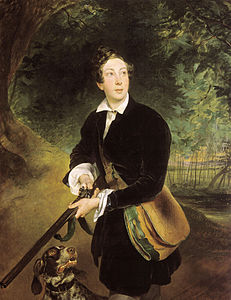Autumn
Aleksey Konstantinovich Tolstoy 1817 (Saint Petersburg) – 1875 (Chernigov Governorate)
Autumn 'tis! Our garden stands
Flowerless and bare,
Dizzy whirling yellow leaves
Fill the wind swept air.
Yet the distant mountain ash
In the vale below,
With our favorite berries red
Now begins to glow.
While with rapture and with pain
Throbbing in my breast,
Pressing hot thy hands in mine,
Silent, unexpressed--
Fondly gazing in thine eyes,
Through my tears I see--
That I can never tell thee
How dear thou art to me!
Font size:
Submitted on May 13, 2011
Modified on March 30, 2023
- 23 sec read
- 79 Views
Quick analysis:
| Scheme | ABCBDEFEGHIFJKKK |
|---|---|
| Closest metre | Iambic trimeter |
| Characters | 413 |
| Words | 77 |
| Stanzas | 1 |
| Stanza Lengths | 16 |
Translation
Find a translation for this poem in other languages:
Select another language:
- - Select -
- 简体中文 (Chinese - Simplified)
- 繁體中文 (Chinese - Traditional)
- Español (Spanish)
- Esperanto (Esperanto)
- 日本語 (Japanese)
- Português (Portuguese)
- Deutsch (German)
- العربية (Arabic)
- Français (French)
- Русский (Russian)
- ಕನ್ನಡ (Kannada)
- 한국어 (Korean)
- עברית (Hebrew)
- Gaeilge (Irish)
- Українська (Ukrainian)
- اردو (Urdu)
- Magyar (Hungarian)
- मानक हिन्दी (Hindi)
- Indonesia (Indonesian)
- Italiano (Italian)
- தமிழ் (Tamil)
- Türkçe (Turkish)
- తెలుగు (Telugu)
- ภาษาไทย (Thai)
- Tiếng Việt (Vietnamese)
- Čeština (Czech)
- Polski (Polish)
- Bahasa Indonesia (Indonesian)
- Românește (Romanian)
- Nederlands (Dutch)
- Ελληνικά (Greek)
- Latinum (Latin)
- Svenska (Swedish)
- Dansk (Danish)
- Suomi (Finnish)
- فارسی (Persian)
- ייִדיש (Yiddish)
- հայերեն (Armenian)
- Norsk (Norwegian)
- English (English)
Citation
Use the citation below to add this poem to your bibliography:
Style:MLAChicagoAPA
"Autumn" Poetry.com. STANDS4 LLC, 2024. Web. 23 Apr. 2024. <https://www.poetry.com/poem/432/autumn>.



Discuss the poem Autumn with the community...
Report Comment
We're doing our best to make sure our content is useful, accurate and safe.
If by any chance you spot an inappropriate comment while navigating through our website please use this form to let us know, and we'll take care of it shortly.
Attachment
You need to be logged in to favorite.
Log In